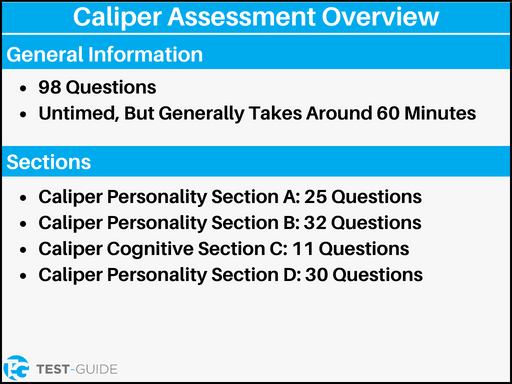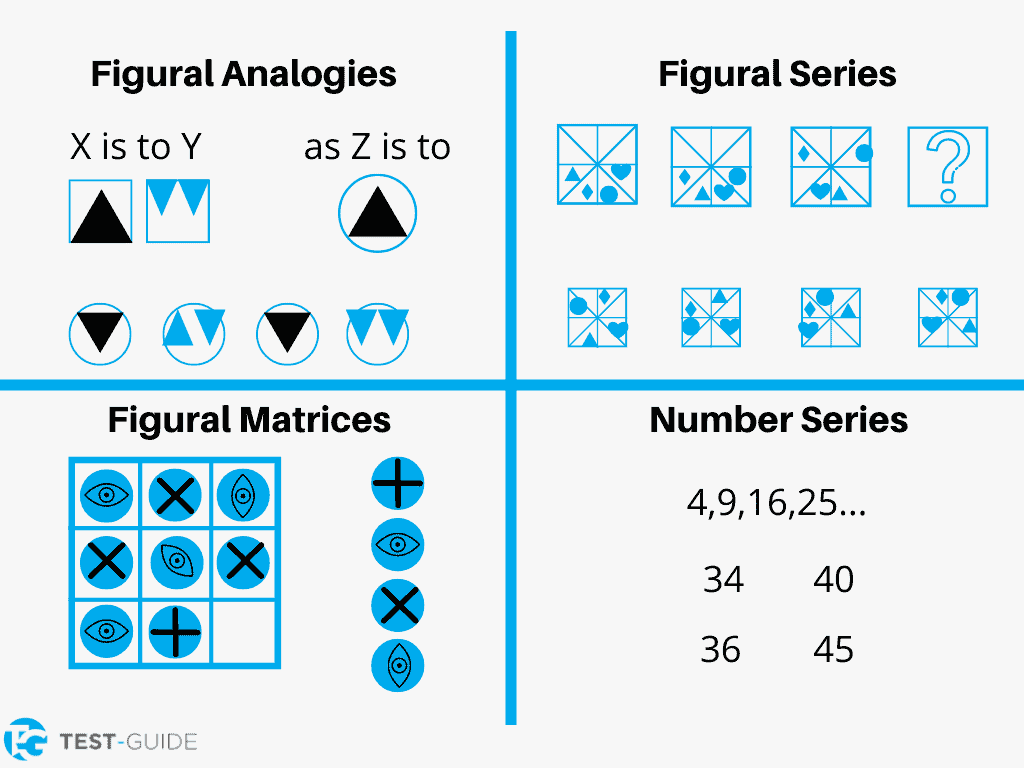The Caliper test (also known as the Caliper profile) is a pre-employment assessment used to predict the performance of a prospective employee. Companies will give this exam to individuals during the hiring process to measure their motivations and personality characterisitics.
This exam is unique because it can be given during all stages of the employee lifecycle. It can be given during hiring, promotions, team building, and planning for the future.
Companies rely on this tool because it costs them far less to administer the exam than it would to make a bad hiring decision.
Key Takeaways:
- Given by employers to prospective employees or current employees.
- Used to predict performance.
- Measures motivations and personality characteristics.
The exam is somewhat similar to a personality test. You can take our big 5 personality test for more information.
Caliper Test Outline
The Caliper test has 98 total questions and consists of 4 different sections:
- Caliper Personality Section A: 25 Questions
- Caliper Personality Section B: 32 Questions
- Caliper Cognitive Section C: 11 Questions
- Caliper Personality Section D: 30 Questions
The exam is not timed, but you can expect it to take about 60 minutes. The exam is administered by Talogy.

Personality Sections
The personality sections of the Caliper exam will be sections A, B, and D. The personality sections make up the majority of the exam.
- Sections A and B will require you to read a statement and select which statement most and least reflects your beliefs.
- Section D will require you to read a statement and rank your level of agreement.
Caliper Personality Section Examples
Most and Least Questions (Sections A and B):
| I am mostly quiet during meetings | Most | Least |
| I don’t like long meetings | Most | Least |
| Meetings are an important tool for a company to run smoothly | Most | Least |
| I prefer to be in charge of meetings I participate in | Most | Least |
Agreement Questions (Section C):
I am mostly quiet during meetings.
- Strongly Agree
- Agree
- Mildly Agree
- Neutral
- Mildly Disagree
- Disagree
- Strongly Disagree
Cognitive Section
The cognitive section of the Caliper exam will be section C.
This section will test your ability to determine patterns and rules from specific scenarios. It consists of four different types of questions.
- Visual Analogies: You will be given two shapes that have something in common. You will then be given a single shape and need to choose what shape has the same common relationship to the single shape.
- Shape Matrices: You will be given rows or columns of a matrix and asked to choose the shape or pattern that comes next in the series.
- Shape Series: You will be given several shapes that follow a logical rule. You will need to determine what the rule is and choose the next shape in the series.
- Number Series: You will get a sequence of numbers that follow a mathematical rule. You will need to determine what the mathematical rule is and choose the next number in the sequence.
Caliper Cognitive Section Examples

If you want more practice with similar questions, consider taking our free IQ test.
Caliper Assessment Study Resources
Since the Caliper test is such a high-stakes exam, you will want to make sure you are prepared. We have listed some resources below to help you study and prepare.
| Resource | Notes | Provider |
| Caliper Prep Course | A Caliper prep resource to help you become more familiar with the actual exam. | JobTestPrep |
| Caliper Profile Overview | Become more familiar with the potential Caliper profiles you will be assigned. | Official Caliper Site |
Caliper Profile Overview
The Caliper profile measures 22 attributes that have been proven to be successful in the workplace. These 22 attributes are grouped into 4 competency categories:
- Leadership/Persuasiveness: This is defined by your ability to lead others. This trait will be particularly important in supervisor and management roles.
- Problem-Solving and Decision-Making: This skill determines how well you build and maintain relationships with others. This trait is important in roles that deal directly with the customer. Some examples include customer service representatives and sales professionals.
- Interpersonal/Service Orientation: How quickly and efficiently can you solve a problem? This skill is desirable in a wide range of positions but is particularly important in leadership roles.
- Personal Organization and Time Management: How well can you organize yourself and manage the tasks required for the job. This skill set is incredibly important for administrative and leadership roles.
There are specific traits that are provided that provide further insight into those 4 categories above.
| Competency Categories | Example Traits |
|---|---|
| Leadership/Persuasiveness | Assertiveness Aggressiveness Ego-Driven Ego-Strength Energy Levelheadedness |
| Problem Solving and Decision Making | Abstract Reasoning Ability Flexibility Idea Orientation Openness |
| Interpersonal/Service Orientation | Accommodation Empathy Gregariousness Skepticism Sociability |
| Personal Organization and Time Management | External Structure Cautiousness Risk Taking Self-Structure Thoroughness Urgency |
Please note that a high trait score may not be “good” while a low trait score may not be “bad”. It will depend on the specific job and what the employer is looking for. Read more below on Caliper scores for more information.
Caliper Scores
Once you complete the Caliper assessment, your results will be compared against the Caliper norm group job models and given an overall fit score. Essentially, your score is being compared with scores of people who are currently in that job and are successful.
The scores range from 1-99. The higher the score, the better fit you are predicted to be for the role. If you score:
- 1-39: Your personality characteristics and motivations are not in line with the position. This indicates you will need extensive training to perform the duties required.
- 40-59: Your personality characteristics and motivations are somewhat aligned with the role. This means you may be a good fit after some training.
- 60-99: Your personality characteristics and motivations are an excellent fit for the position, and you will likely thrive within this role.
Your results go directly to your prospective employer. This in-depth comparison and score allow the employer to quickly see how well you will be able to fulfill a particular job’s duties.
After assessing how well you will fit in a particular role, an employer can also use the Caliper assessment data to support you in certain areas and help you develop new skills that allow you to excel in your new role.
You will not personally receive a copy of the in-depth Caliper profile. It will be up to your potential employer to share any results with you.
Frequently Asked Questions
Is the Caliper assessment reliable?
Yes, the Caliper Assessment has been scientifically validated for use in roles ranging from entry-level to senior leaders. It has also been administered and validated in many different industries, from Pharmaceuticals to professional sports.
Is the Caliper assessment legal under the equal opportunity employment act?
Yes, the Caliper assessment was developed under the U.S. Department of Labor guidelines and the Society for Industrial and Organizational Psychology regulations.
The exam also meets all of the requirements for the Equal Employment Opportunity Commission.
What if I need more time to take the assessment?
It is recommended that you complete the assessment in one sitting. That being said, there is no proctor and no time limit, so you can take as much time as you need.
Can the Caliper assessment be used with current employees?
Yes, the data collected on candidates is helpful in the hiring process and in understanding how to meet your employees’ needs.
The exam can be administered to individuals in your organization who may be eligible for a promotion or new position.

